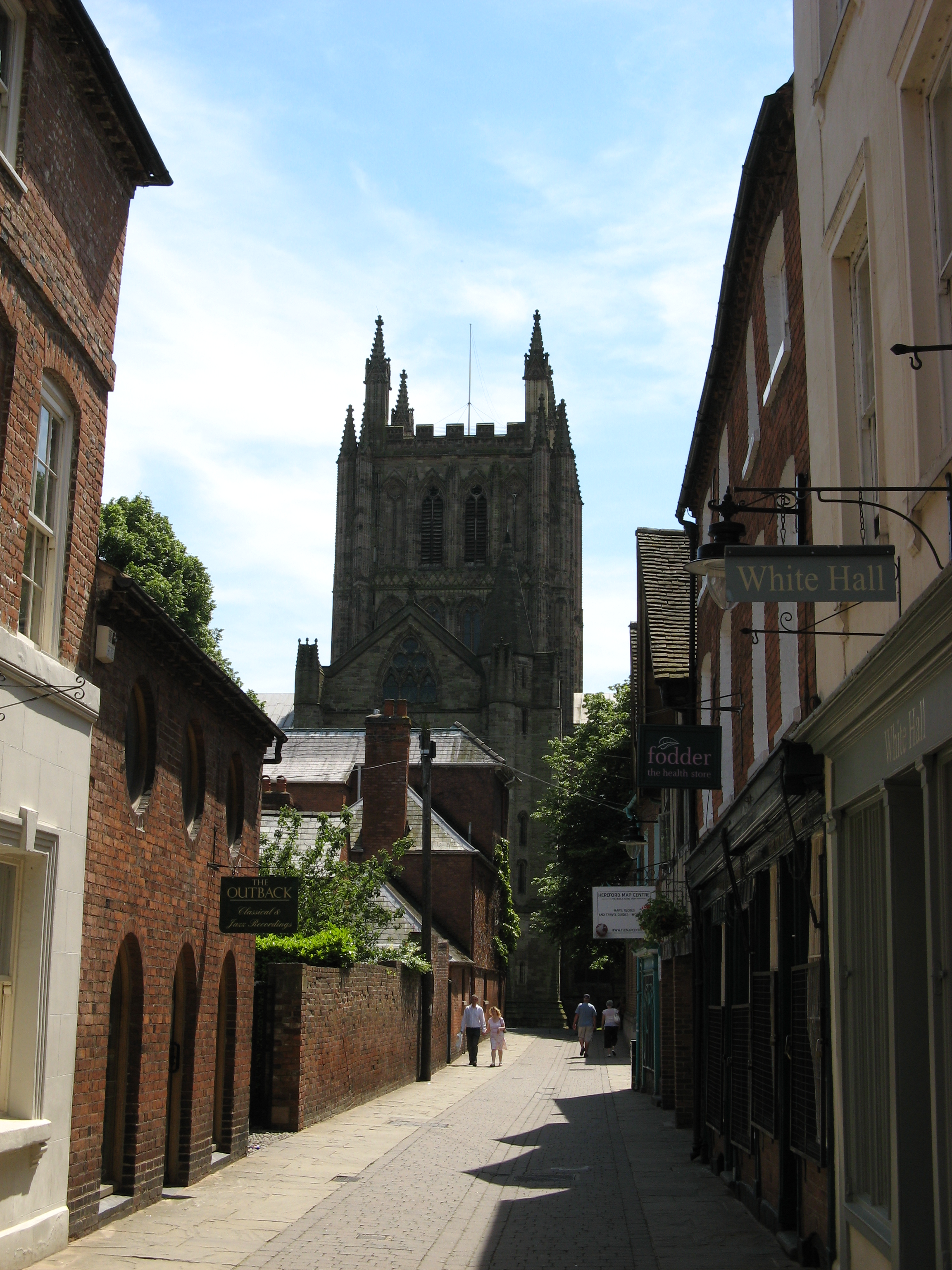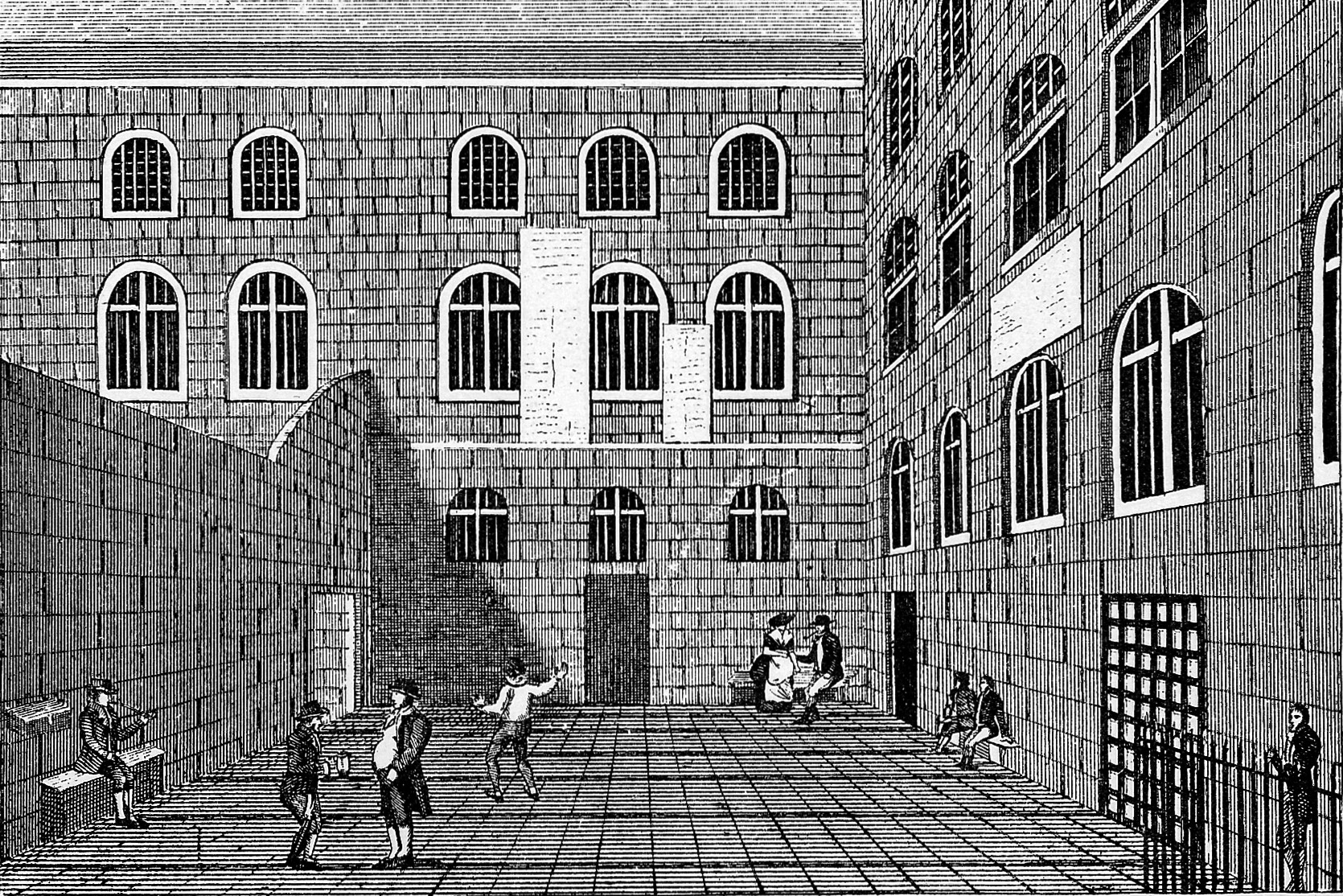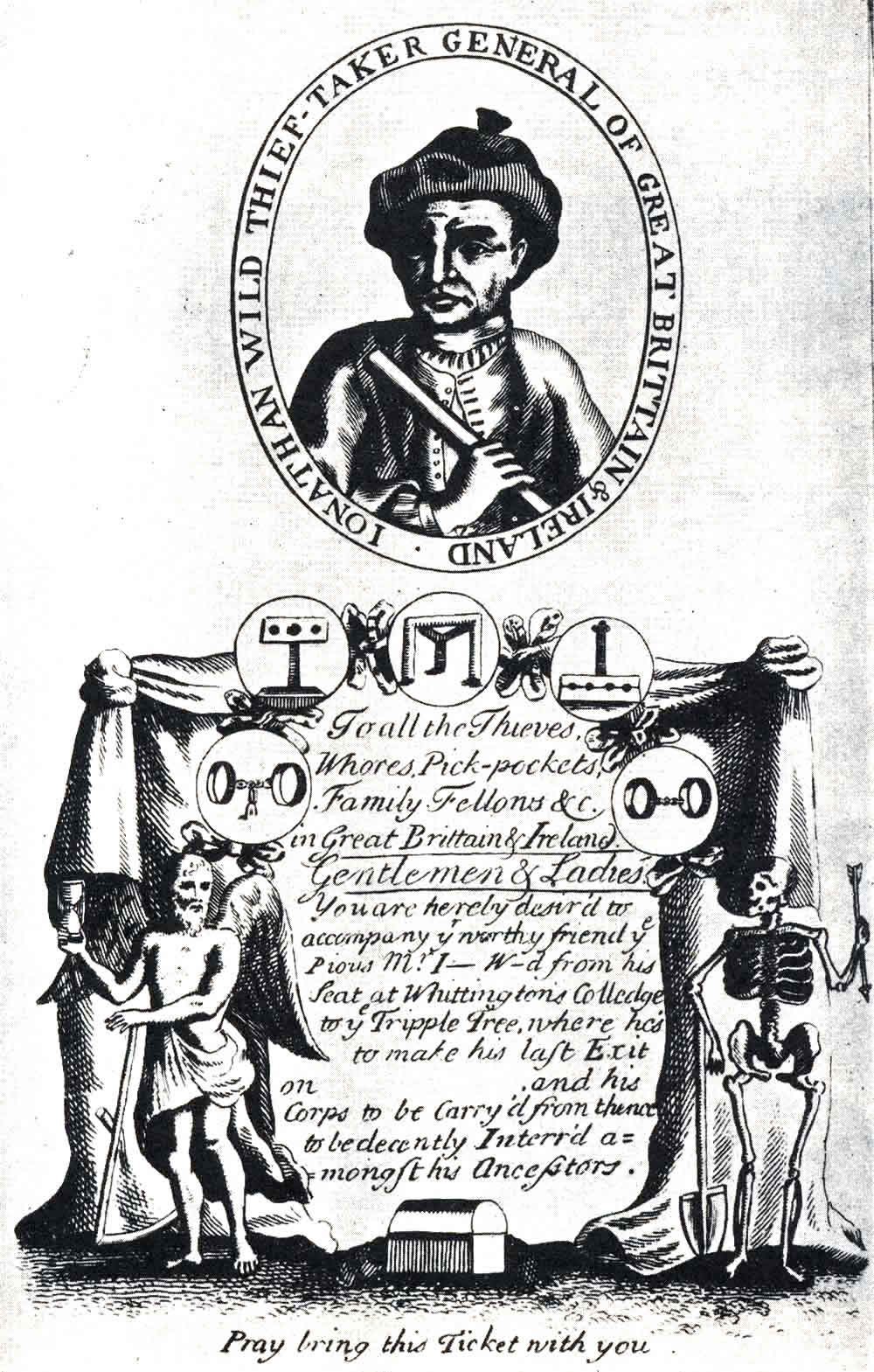|
William Spiggot
William Spiggot (also spelled Spigget) was a highwayman who was captured by Jonathan Wild's men in 1721. During his trial at the Old Bailey, he at first refused to plead and was therefore sentenced to be pressed until he pleaded. This was called ''Peine forte et dure''. He was later executed, after a second trial when he pleaded not guilty, on 11 February 1721 at Tyburn, London. Biography William Spiggot or Spigget was born in Hereford, England. His father was an innkeeper (or ostler in the English of the time) at the ''Chief Inn''. He was married (probably at 19 years old) and he had three children. He declared that he was an apprentice to a cabinet-maker or joiner in Hereford. He is best known for his criminal life as a highwayman. Criminal Life For about seven to twelve years, William Spiggot was a highwayman and the leader of a gang of at least eight men. He performed his robberies on the roads from London to Hounslow Heath, Kingston and Ware. The exact number of ... [...More Info...] [...Related Items...] OR: [Wikipedia] [Google] [Baidu] |
Hereford
Hereford () is a cathedral city, civil parish and the county town of Herefordshire, England. It lies on the River Wye, approximately east of the border with Wales, south-west of Worcester and north-west of Gloucester. With a population of 53,112 in 2021 it is by far the largest settlement in Herefordshire. An early town charter from 1189, granted by Richard I of England, describes it as "Hereford in Wales". Hereford has been recognised as a city since time immemorial, with the status being reconfirmed as recently as October 2000. It is now known chiefly as a trading centre for a wider agricultural and rural area. Products from Hereford include cider, beer, leather goods, nickel alloys, poultry, chemicals and sausage rolls, as well as the famous Hereford breed of cattle. Toponymy The Herefordshire edition of Cambridge County Geographies states "a Welsh derivation of Hereford is more probable than a Saxon one" but the name "Hereford" is also said to come from the Angl ... [...More Info...] [...Related Items...] OR: [Wikipedia] [Google] [Baidu] |
Ordinary Of Newgate's Account
''The Ordinary of Newgate's Account'' was a sister publication of the ''Old Bailey's Proceedings'', regularly published from 1676 to 1772 and containing biographies and last dying speeches of the prisoners executed at Tyburn during that period. The ''Accounts'' were written by the chaplain (or "Ordinary") of Newgate Prison, recounting the statements made by the condemned during confession. Over 400 editions were published, containing biographies of some 2,500 executed criminals. Although target of many objections and criticism during the 18th century, since much of their contents can be verified from external sources, if carefully used the ''Accounts'' provide an important source of knowledge on many aspects of 18th century English history. All surviving accounts relating to convicts tried at sessions of the Old Bailey court and published under the name of the Ordinary of Newgate can be consulted on the Old Bailey Proceedings Online website. Form of the Accounts The external f ... [...More Info...] [...Related Items...] OR: [Wikipedia] [Google] [Baidu] |
Thief-taker
In English legal history, a thief-taker was a private individual hired to capture criminals. The widespread establishment of professional police in England did not occur until the 19th century. With the rising crime rate and newspapers to bring this to the attention of the public, thief-takers arose to partially fill the void in bringing criminals to justice. These were private individuals much like bounty hunters. However, thief-takers were usually hired by crime victims, while bounty hunters were paid by bail bondsmen to catch fugitives who skipped their court appearances and hence forfeited their bail. Both types also collected bounties offered by the authorities. Sometimes, thief-takers would act as go-betweens, negotiating the return of stolen goods for a fee. However, they were often corrupt themselves, for example extorting protection money from the crooks they were supposed to catch. Government-funded rewards for the capture of criminals were a corrupting influence, leadi ... [...More Info...] [...Related Items...] OR: [Wikipedia] [Google] [Baidu] |
List Of Highwaymen
This is a chronological list of highwaymen, land pirates, mail robbery, mail coach robbers, road agents, stagecoach robbers, and bushrangers active, along trails, roads, and highways, in Europe, North America, South America, Australia, Asia, and Africa, from ancient times to the 20th century, arranged by continent and country. List Europe North America South America Australia Asia Further reading * Russell Ash, Ash, Russell (1970). ''Highwaymen'', Shire Publications, ; revised edition (1994) * Brandon, David (2004). ''Stand and Deliver! A History of Highway Robbery'', Sutton Publishing, * Dunford, Stephen (2000). ''The Irish Highwaymen'', Merlin Publishing, * Haining, Peter (1991). ''The English Highwayman: A Legend Unmasked'', Robert Hale, * Harper, Charles George (1908). ''Half-hours with the Highwaymen: picturesque biographies and traditions of the "knights of the road"'', Chapman & HallOnline edition via Internet Archive. * Pringle, Patrick (1951). ''St ... [...More Info...] [...Related Items...] OR: [Wikipedia] [Google] [Baidu] |
The Newgate Calendar
''The Newgate Calendar'', subtitled ''The Malefactors' Bloody Register'', was a popular work of improving literature in the 18th and 19th centuries. Originally a monthly wikt:bulletin, bulletin of executions, produced by the Prison governor, Keeper of Newgate Prison in London, the Calendar's title was appropriated by other publishers, who put out biography, biographical chapbooks about notorious criminals such as Sawney Bean, Dick Turpin, John Wilkes and Moll Cutpurse. Collected editions of these stories began to appear in the mid-18th century, and in 1774 a five-volume bound edition became the standard version. While many of its accounts are highly embellished and/or drawn uncritically from other sources, they are lively and full of incident, and often refer to contemporary events and social issues. Along with the Bible and John Bunyan's ''The Pilgrim's Progress'', the ''Calendar'' was famously in the top three works most likely to be found in the average home. The entries ... [...More Info...] [...Related Items...] OR: [Wikipedia] [Google] [Baidu] |
The Manner Of Execution At Tyburn
''The'' () is a grammatical article in English, denoting persons or things already mentioned, under discussion, implied or otherwise presumed familiar to listeners, readers, or speakers. It is the definite article in English. ''The'' is the most frequently used word in the English language; studies and analyses of texts have found it to account for seven percent of all printed English-language words. It is derived from gendered articles in Old English which combined in Middle English and now has a single form used with pronouns of any gender. The word can be used with both singular and plural nouns, and with a noun that starts with any letter. This is different from many other languages, which have different forms of the definite article for different genders or numbers. Pronunciation In most dialects, "the" is pronounced as (with the voiced dental fricative followed by a schwa) when followed by a consonant sound, and as (homophone of pronoun ''thee'') when followed by a v ... [...More Info...] [...Related Items...] OR: [Wikipedia] [Google] [Baidu] |
Shilling
The shilling is a historical coin, and the name of a unit of modern currencies formerly used in the United Kingdom, Australia, New Zealand, other British Commonwealth countries and Ireland, where they were generally equivalent to 12 pence or one-twentieth of a pound before being phased out during the 20th century. Currently the shilling is used as a currency in five east African countries: Kenya, Tanzania, Uganda, Somalia, as well as the ''de facto'' country of Somaliland. The East African Community additionally plans to introduce an East African shilling. History The word ''shilling'' comes from Old English "Scilling", a monetary term meaning twentieth of a pound, from the Proto-Germanic root skiljaną meaning 'to separate, split, divide', from (s)kelH- meaning 'to cut, split.' The word "Scilling" is mentioned in the earliest recorded Germanic law codes, those of Æthelberht of Kent. There is evidence that it may alternatively be an early borrowing of Phoenician ... [...More Info...] [...Related Items...] OR: [Wikipedia] [Google] [Baidu] |
Finchley Common
Finchley Common was an area of land in Middlesex, north of London, and until 1816, the boundary between the parishes of Finchley, Friern Barnet and Hornsey. History Its use as a common is quite late. Rights to the common were claimed by the inhabitants of Finchley at the beginning of the 15th century, and by the inhabitants of Friern Barnet, and Hornsey by the 16th century. Sale of timber in the 16th century by the Bishop of London, who had manorial rights to the land, led to the clearance of the woods, and after this time legal disputes between the commoners and the bishop were made reference to a "common called Finchley Wood". The earliest known use of the name Finchley Common appeared in reference to refugees escaping from plague London encamped on the common in 1603. Finchley Common occurs in Nicholas Culpeper's ''Herbal'' (1652) whereas John Gerard in his ''Herbal'' (1596) refers to Finchley Wood (2). As a place name Finchley Common continued long after the enclosure of ... [...More Info...] [...Related Items...] OR: [Wikipedia] [Google] [Baidu] |
Finchley
Finchley () is a large district of north London, England, in the London Borough of Barnet. Finchley is on high ground, north of Charing Cross. Nearby districts include: Golders Green, Muswell Hill, Friern Barnet, Whetstone, Mill Hill and Hendon. It is predominantly a residential suburb, with three town centres: North Finchley, East Finchley and Finchley Church End (Finchley Central). Made up of four wards, the population of Finchley counted 65,812 as of 2011. History Finchley probably means "Finch's clearing" or "finches' clearing" in late Anglo-Saxon; the name was first recorded in the early 13th century. Finchley is not recorded in Domesday Book, but by the 11th century its lands were held by the Bishop of London. In the early medieval period the area was sparsely populated woodland, whose inhabitants supplied pigs and fuel to London. Extensive cultivation began about the time of the Norman conquest. By the 15th and 16th centuries the woods on the eastern side of th ... [...More Info...] [...Related Items...] OR: [Wikipedia] [Google] [Baidu] |
Esquire
Esquire (, ; abbreviated Esq.) is usually a courtesy title. In the United Kingdom, ''esquire'' historically was a title of respect accorded to men of higher social rank, particularly members of the landed gentry above the rank of gentleman and below the rank of knight. Some sources cite that the title was bestowed on "candidates for knighthood in England," and even used with respect to other dignitaries, such as justices of the peace, sheriffs, and sergeants. According to research by a New York City Bar Association committee, in the United States, esquire over time came to refer "commonly and exclusively" to lawyers, but how that happened is unclear. The only certainty, the committee stated, is that "based on common usage it is fair to state that if the title appears after a person’s name, that person may be presumed to be a lawyer". The 1826 edition of William Blackstone's ''Commentaries on the Laws of England'' reiterated that "the title should be limited to those only ... [...More Info...] [...Related Items...] OR: [Wikipedia] [Google] [Baidu] |
Guinea (British Coin)
The guinea (; commonly abbreviated gn., or gns. in plural) was a coin, minted in Great Britain between 1663 and 1814, that contained approximately one-quarter of an ounce of gold. The name came from the Guinea region in West Africa, from where much of the gold used to make the coins was sourced. It was the first English machine-struck gold coin, originally representing a value of 20 shillings in sterling specie, equal to one pound, but rises in the price of gold relative to silver caused the value of the guinea to increase, at times to as high as thirty shillings. From 1717 to 1816, its value was officially fixed at twenty-one shillings. In the Great Recoinage of 1816, the guinea was demonetised and the word "guinea" became a colloquial or specialised term. Although the coin itself no longer circulated, the term ''guinea'' survived as a unit of account in some fields. Notable usages included professional fees (medical, legal, etc.), which were often invoiced in guineas, and h ... [...More Info...] [...Related Items...] OR: [Wikipedia] [Google] [Baidu] |




.png)


